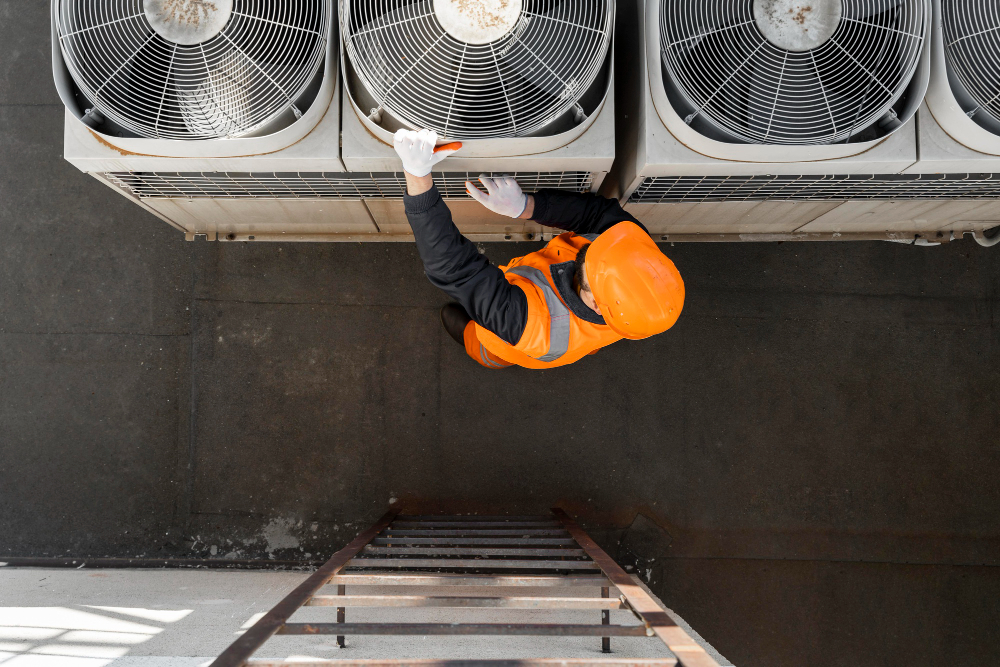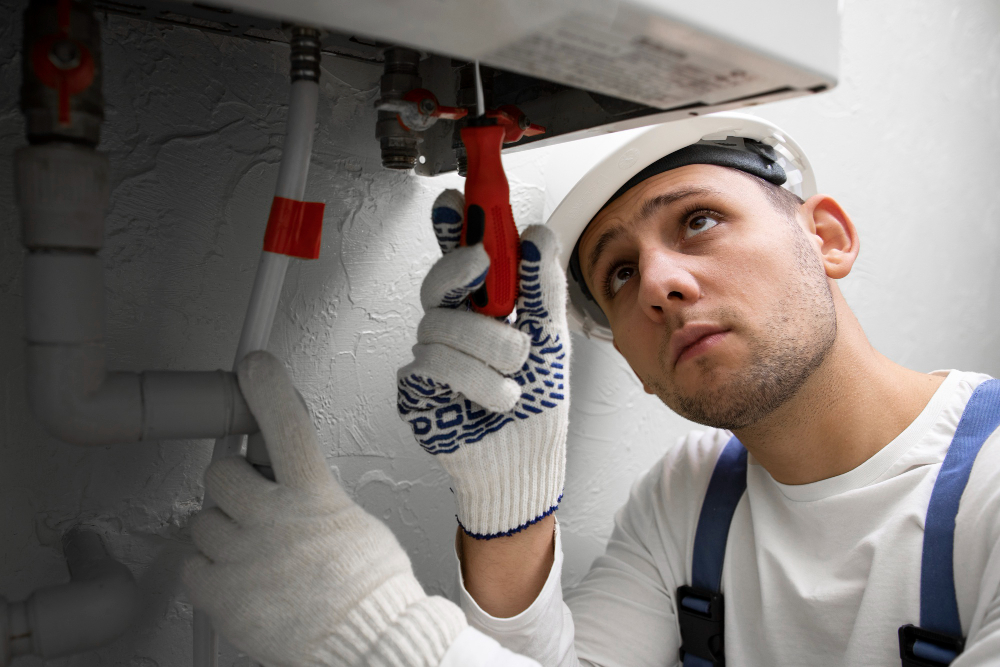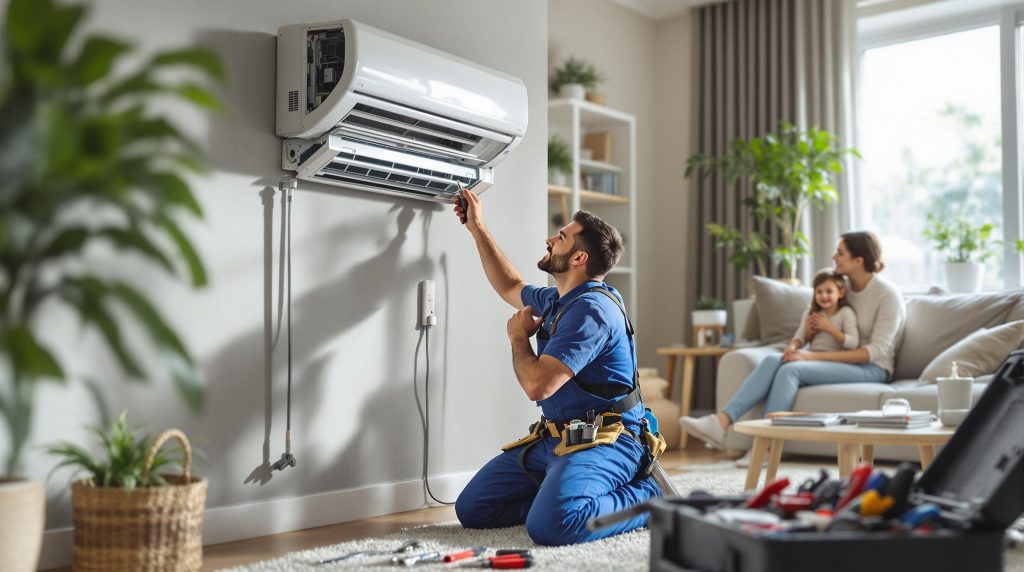Are you sweltering in the summer heat because your home AC repair isn’t functioning properly? Don’t worry; we’ve got you covered. In this extensive guide, we will explore everything you need to know about home AC repair, from common problems to DIY fixes, and when it’s time to call in the professionals. By the end of this article, you’ll be equipped to handle AC issues like a pro, ensuring your home remains a cool oasis during the scorching summer months.

The Importance of a Well-Functioning Home AC
Your home’s air conditioning system plays a vital role in maintaining a comfortable and healthy living environment. When your AC is functioning optimally, it:
- Keeps You Cool: The most obvious benefit of a well-working AC system is that it keeps your home cool, making it a comfortable space to live and relax in. Proper maintenance and timely home AC repair ensure your system consistently delivers the refreshing coolness you need to beat the summer heat.
- Improves Indoor Air Quality: Modern AC units often come equipped with air filters that help remove dust, pollen, and other allergens from the air. This leads to better indoor air quality and can benefit individuals with allergies or respiratory issues. Regular air filter maintenance is essential for ensuring that your AC continues to provide this benefit.
- Enhances Productivity: Excessive heat can be a significant distraction and drain your energy. A properly functioning AC can help improve focus and productivity in your home office or workspace. When you experience issues like inadequate cooling, addressing them promptly with DIY AC repairs can help you maintain a productive atmosphere.
- Preserves Your Belongings: AC systems help control indoor humidity, which is essential for protecting your furniture, electronics, and other valuable items from moisture damage. Neglecting to address issues like water leaking from AC units can jeopardize the safety of your belongings.
Common Home AC Problems
Before we dive into DIY repair tips and when to call professionals, let’s discuss some common home AC repair problems you might encounter. Identifying the issue correctly is the first step in effective AC repair.
1. Poor Cooling Performance
If you notice that your home isn’t cooling as it should, there could be several reasons for this issue. Common culprits include a clogged air filter, a refrigerant leak, or problems with the thermostat. We need home ac repair.
2. Strange Noises
Unusual sounds from your AC unit, such as banging, screeching, or hissing, can indicate mechanical or electrical problems. It’s crucial to address these noises promptly to prevent further damage.
3. Leaking Water
If you notice water pooling around your AC unit or leaking from it, it may be due to a clogged condensate drain, frozen evaporator coils, or a refrigerant leak. Water leaks can lead to more significant issues, so it’s vital to address them promptly.
4. Uneven Cooling
Uneven cooling in your home can be frustrating. It may result from issues with your ductwork, improperly sized AC unit, or thermostat problems.
DIY Home AC Repair Tips
Now that you’re familiar with common AC problems, let’s explore some DIY repair tips that can help you address minor issues without the need for professional assistance. Remember to follow safety guidelines and turn off the power before attempting any repairs.
1. Changing the Air Filter
A dirty or clogged air filter restricts airflow, reducing your AC’s efficiency. Regularly check and replace your air filter, typically every 1-3 months, to maintain optimal cooling performance.
2. Cleaning the Evaporator Coils
Dirty evaporator coils can reduce cooling efficiency. Turn off the power, remove the coil cover, and gently clean the coils with a soft brush or a coil cleaner. Be careful not to bend the coil fins.
3. Clearing the Condensate Drain
A clogged condensate drain can lead to water leaks. Locate the drain line, typically near the indoor unit, and use a wet/dry vacuum or a condensate drain cleaner to clear any blockages.
4. Checking the Thermostat
If you suspect thermostat issues, calibrate it or replace the batteries. Ensure it’s correctly set to the desired temperature and operating mode.
5. Sealing Air Leaks
Air leaks in your ductwork can lead to uneven cooling. Seal any gaps or cracks in your ducts with duct sealant or foil tape. Also, consider insulating ducts in unconditioned spaces.
When to Call in the Professionals
While DIY repairs can address minor AC problems, some issues require the expertise of HVAC professionals. Here are situations where it’s best to call for professional help:
1. Refrigerant Leaks
Handling refrigerant is a job for trained technicians. If you suspect a refrigerant leak due to a drop in cooling performance, unusual noises, or ice buildup on the evaporator coils, call a professional to diagnose and fix the issue.
2. Electrical Problems
Electrical problems can be dangerous. If you experience issues with your AC’s wiring, such as tripped breakers, sparks, or power surges, contact an electrician or HVAC technician to ensure your safety and prevent further damage.
3. Major Component Failures
If major components like the compressor or condenser fail, it’s best to leave the repairs to HVAC experts. Replacing or repairing these components requires specialized knowledge and tools.
4. System Replacement
If your home AC repair unit is old, inefficient, or frequently malfunctioning, it might be time for a full replacement. An HVAC professional can help you select a new unit that suits your home’s needs and install it correctly.

Tips for Maintaining Your AC
Preventing AC issues is as important as knowing how to home AC repair them. Here are some maintenance tips to keep your AC running smoothly:
- Regularly clean and replace air filters: Clean or replace air filters every 1-3 months to maintain efficient airflow.
- Clean the condenser coils: Keep the outdoor unit’s condenser coils clean by removing debris and vegetation around it.
- Schedule annual maintenance: Arrange for professional HVAC maintenance at least once a year to catch and address issues before they become major problems.
- Maintain a consistent temperature: Avoid frequent temperature adjustments, which can strain your home AC repair system. Use a programmable thermostat to maintain a consistent indoor temperature.
- Check for leaks: Inspect your ductwork for air leaks, and seal them with appropriate materials.
Conclusion
A well-functioning home AC repair is essential for your comfort and well-being, and it’s crucial to address common AC problems like poor cooling performance, strange noises, leaking water, and uneven cooling promptly to ensure that your home remains a comfortable oasis during hot summer months. By practicing DIY home AC repair for minor issues and knowing when to call in the professionals for problems like refrigerant leaks, electrical issues, major component failures, and system replacement, you can keep your AC running smoothly.
Furthermore, regular maintenance and following tips like changing the air filter, cleaning the evaporator coils, clearing the condensate drain, checking the thermostat, and sealing air leaks can extend the lifespan of your home AC repair system. With the right knowledge and proactive approach, you’ll be able to keep your cool, even on the hottest days of summer.


